Society
- Details
- By David Cao
- Hits: 975
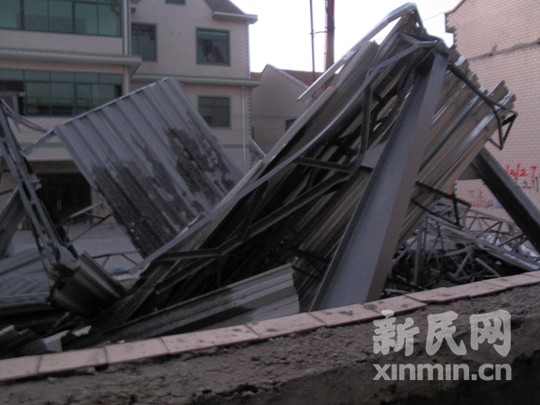
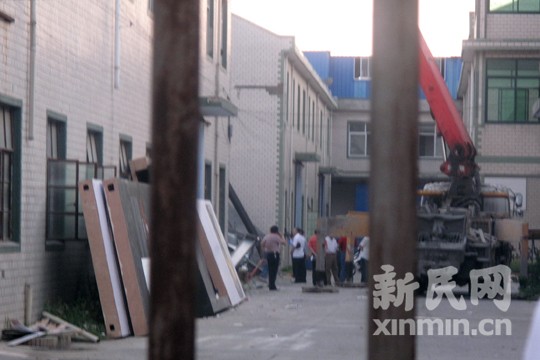
Two construction workers were killed and six more injured Saturday after the collapse of a plastic factory workshop in Shanghai, police said.
The workshop under construction fell down at around 5 p.m. in the Pudong New Area, reduced to more than 300 square meters of debris.
Two workers died in hospital. Of the six injured, three were in critical condition.
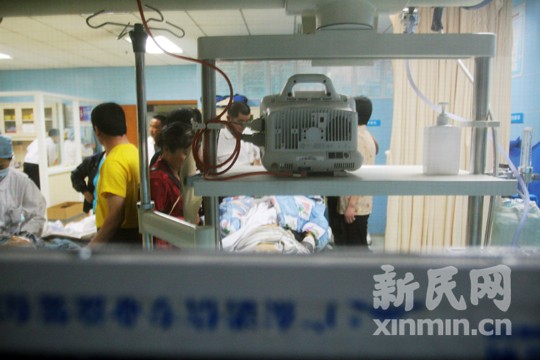
Police investigation is underway.
- Details
- By David Cao
- Hits: 1425
A woman in Dongguan, Guangdong province, jumps from a six-story building on May 7, 2009 in an effort to prevent police from seizing her husband who was cornered in the building on suspicion of stealing power cables. The woman, who fell on the inflatable mattress prepared by the police, only suffered minor injuries.

A woman in Dongguan, Guangdong province, jumps from a six-story building on May 7, 2009. Her husband, which has been hold from jumping, is on the left in the picture.
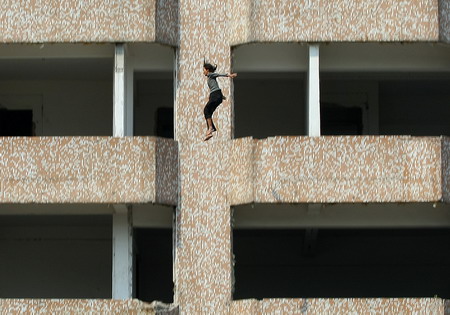
A woman in Dongguan, Guangdong province, jumps from a six-story building on May 7, 2009.
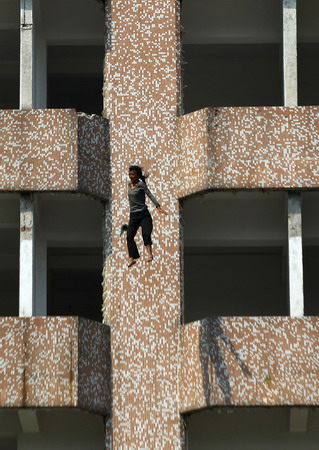
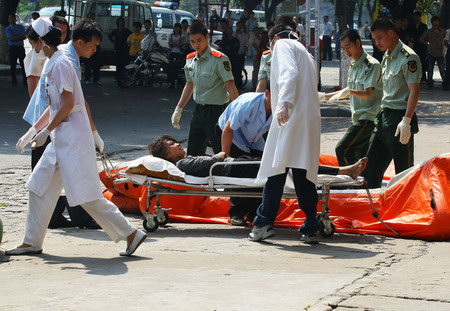
A woman is sent to hospital after jumping from a six-story building to the inflatable mattress in Dongguan, Guangdong province, May 7, 2009.
- Details
- By David Cao
- Hits: 797
China's Foreign Ministry said it is "verifying" claims that 77 Chinese children went missing from a home in Britain, allegedly sold to work in the prostitution and drugs trade.
British newspaper The Guardian, citing a secret immigration document on Tuesday, said at least 77 Chinese children had gone missing since March 2006 from the children's home, operated by the London borough of Hillingdon.
The anti-human trafficking office, under China's Ministry of Public Security, said on Friday that it has learnt of the case and Chinese police may take part in the investigation.
Chinese police have experience in taking joint action with other countries in cracking down on human trafficking, said the office. It has signed a memorandum of cooperation with its British counterparts, so if the trafficked children were Chinese citizens, the office can become involved.
The Guardian cited the "restricted" report as saying victims of a trafficking network, that has agents based as far apart as China, Brazil, Japan, Malaysia and Kenya, arrived at the home just outside the airport perimeter, only to disappear almost immediately.
China's embassy in London said on Friday it hoped the UK side could clarify the issue as soon as possible.
An embassy spokesman said China is opposed to human trafficking of all kinds.
Only four of the 77 children have been found, according to The Guardian. Two girls returned after a year of exploitation in brothels in the Midlands. Others, said the article, are coerced with physical threats to work as street-sellers of counterfeit goods. It is thought many also work on illegal cannabis farms.
UK Prime Minister Gordon Brown vowed on Wednesday to investigate the report.
- Details
- By Xinhua
- Hits: 1135

With an average age of 35, Chinese filmmakers, led by talented director Lu Chuan, have shown their own understanding of the Nanjing Massacre more than 70 years ago as "City of Life and Death" premieres in Beijing on Thursday -- one week ahead of its global release.
"We don't want that when people think of that period of history, only some dry figures come up to their mind. We hope people will see some particular faces and their expressions and characteristics," said Lu at the premiere ceremony.
"City of Life and Death" focuses on Chinese soldiers and civilians' fight against invaders before and after the Nanjing Massacre in 1937.
It took four years and cost 80 million yuan ($11.7 million) to finish the work, whose original Chinese title is "Nanjing! Nanjing!" More than 20,000 college students volunteered in the film.
- Details
- By Xinhua
- Hits: 824
Visitors were scarce at the Guangdong Dongtai Dairy Products booth during the third phase of the 105th China Import and Export Fair, also called the Canton Fair.
The third phase of China's largest trade event began here Sunday and ended Thursday.
Xu Haoming, who's in charge of external trade for Dongtai, said he wasn't surprised by the lack of visitors.
Based in the Jiedong economic development zone of south China's Guangdong Province, Dongtai specializes in dairy products such as baby milk powder. It exports to Asian and African countries.
Demand has fallen because of the global downturn, but that's common to all industries, said Xu. The dairy industry has an additional problem.
"The blow to Chinese food businesses from food safety problems such as the melamine contamination scandal last year" has been almost fatal, said Xu.
The melamine-adulteration milk and baby formula scandal, which left six infants dead and almost 300,000 ill, came to light last September. It had a swift impact on China's dairy product exports.
According to the General Administration of Customs, dairy exports dropped 10.4 percent last year to 121,000 tons after the scandal made the headlines.
Xu said his company's exports are down 50 percent.
More Articles …
Page 218 of 255